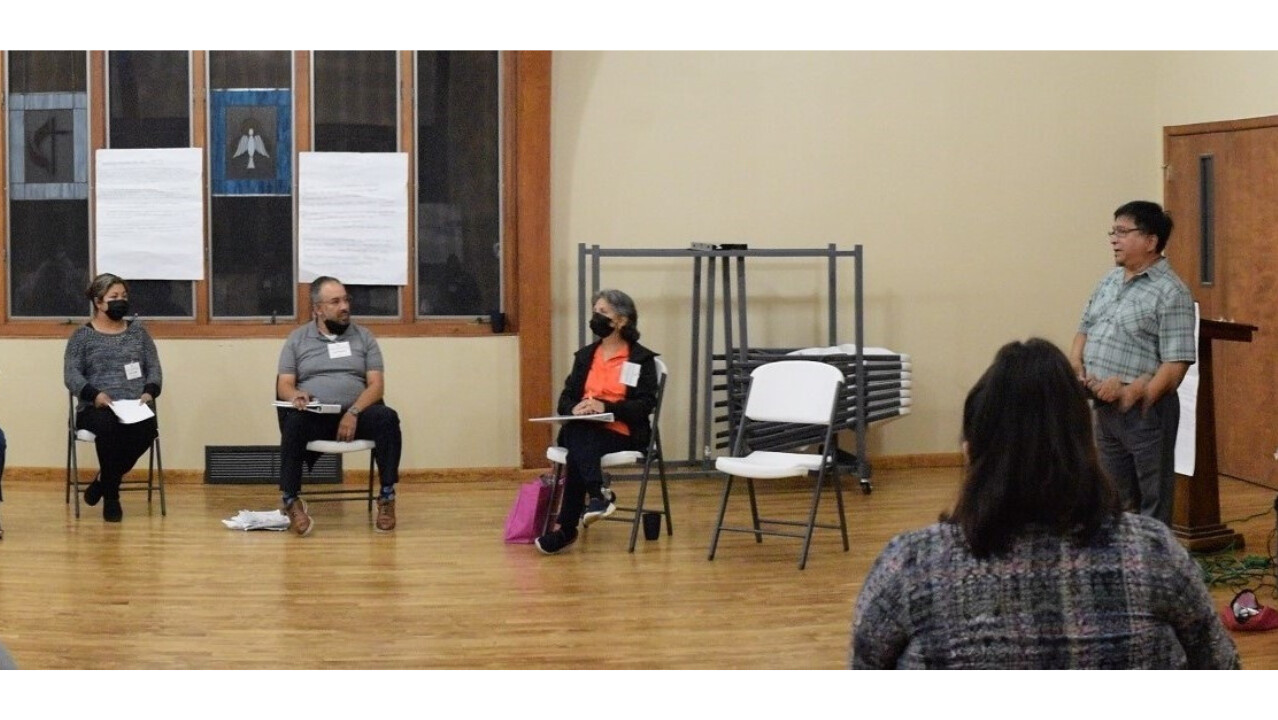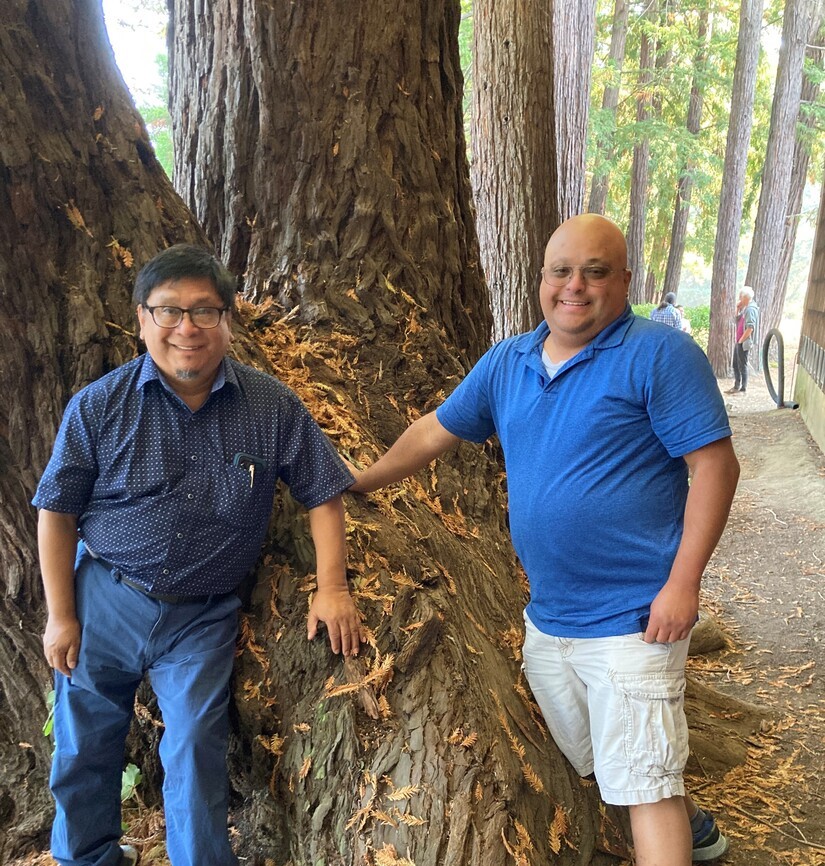
AFSC's Pedro Sosa (standing) leads an immigrant rights training in Oregon. Photo: Alonso Oliveros/AFSC
Dignity, humanity, and the inherent worth of all people—regardless of immigration status—are the core values of AFSC’s work with immigrants across the U.S. and around the world. As the Trump administration continues to harm immigrant communities, AFSC is helping community members nationwide learn about, exercise, and defend their constitutional and civil rights.
In multiple states, we are conducting Know Your Rights trainings for immigrants and allies. We sat down with Alonso Oliveros, program associate for AFSC Project Voice, to discuss what these trainings look like and the impact they’ve had in the Pacific Northwest.
Q: What is a Know Your Rights training?
A: Know Your Rights (KYR) training may mean something unique to every one of us depending on our lived experience and socioeconomic status. In a traditional sense, KYR training equips individuals with the knowledge of their constitutional rights and how to exercise and defend those rights during interactions with Immigration and Customs Enforcement (ICE), police, or during protests and marches.
We learn about the legal system, what to expect if arrested or detained, and how to stay safe while interacting with law enforcement or ICE. We also learn about important community resources such as legal services available in our areas, how to access food assistance, or how to develop an emergency family action plan and legal documents to have in case migrant families are separated.
Q: How do you make this complex information accessible to people with different backgrounds and experiences?
A: All this information can be very overwhelming and anxiety-provoking. It’s further complicated by the fact that each person’s fight for immigration relief is unique based on their experiences. Each immigration story is shaped by trauma and resilience. That’s why KYR training is more than legal workshops; they are participatory, and they are healing spaces where migrant voices are honored. Participants share their journeys to build empathy, reclaim dignity, and forge solidarity.
During our interactive trainings, we strive to create safe spaces where participants can share their migrant journeys. This can help migrants manage emotions, gain a better sense of belonging, counter stress and social isolation, and increase self-confidence. It can also help allies better understand the plight immigrants face, to give them a sense of what it would be like to really “walk in their shoes.”
Q: AFSC Project Voices use popular education in its training. What does that mean?
A: KYR trainings are grounded in global liberation movements—from South Africa’s anti-apartheid fight to the U.S. Civil Rights Movement and Latin American resistance to dictatorships. Like Freedom Schools of the civil rights era, KYR sessions equip people with legal knowledge as resistance. They mirror Latin American organizing strategies that used underground networks, art, and solidarity to resist repression.
Our methods draw from Paulo Freire’s Popular Education, where learning is mutual and liberating, and Augusto Boal’s Theatre of the Oppressed, where participants role-play real-life scenarios to practice courageous action. Participants become “spect-actors,” engaging in role-plays where they confront ICE, assert rights, and support one another. Knowledge is shared, not imposed. Learning comes not so much from a traditional “teacher to disciple” hierarchy but rather from the shared collective learning experiences. Everyone’s ideas help shape a critical analysis of what to do under certain circumstances. These interactive sessions build emotional and cognitive strength for high-stress encounters when confronted by ICE agents.

Pedro Sosa and Alonso Oliveros of AFSC's Project Voice Program in Oregon. Photo: Jon Krieg/AFSC
Q: Can you describe what AFSC’s Know Your Rights trainings look like in Oregon?
Since the 2024 election, AFSC Oregon’s Project Voice—led by Program Director Pedro Sosa and me —has launched Asambleas Populares (Popular Townhalls) across Oregon. These gatherings commenced in Salem, Oregon with attendance by over 130 people who came from as far south as Medford to as far north as Bellingham, Washington near the Canadian border. In recent months, Asambleas were held in Albany, Beaverton, Eugene, Lincoln City and Newport. These are cities with different immigrant populations, from long-established Mexican communities to coastal towns with intimate Guatemalan Indigenous communities.
Each session begins with attendees sharing meaningful photos or objects tied to their migration story. This helps them tell their personal narratives about what brought them here, their struggles, their sacrifices, and their resilience. These rituals affirm each person's dignity and humanize their experience. Unsurprisingly, heart-wrenching stories shared are powerful: parents afraid to drive, children kept from school, families too fearful to seek social services. Asambleas counter that fear with connection and action.
We then lead into a musical performance of traditional folkloric songs with modified lyrics about struggle and resilience that highlight immigrant experiences, echoing protest songs and rituals from liberation movements worldwide.
Then we discuss anti-immigrant policies, debunk myths, and explore key constitutional rights—especially the First, Fourth, Fifth, and Sixth Amendments. Participants then break out into discussion groups to analyze these amendments before regrouping to present social dramas of everyday scenarios, whether at home, workplace, or in public spaces—to practice exercising their rights when confronted by ICE agents. These social dramas foster confidence and collective strength.
During the trainings, we also have mental health therapists who can offer care if a participant needs emotional support and other social service providers that provide information on their resources.
Q: What outcomes have you seen from these trainings?
Despite the circumstances they face, many participants walk away from the training feeling empowered and responsible to share what they learned with their friends, neighbors, co-workers, and family. The most significant part is the transformation they undergo—from having entered the room with worry and anxiety to leaving equipped with knowledge, tools, and a renewed hope.
They are motivated to organize their communities for follow-up actions. That includes creating rapid response networks, setting up mutual aid for impacted families, and creating emergency action plans in case a loved one is detained.
KYR trainings are just one piece of how AFSC is supporting immigrants and allies in working to end the cruelty of our inhumane immigration detention and deportation system. By knowing, exercising, and defending our constitutional rights—regardless of where we came from—we affirm our inherent value and dignity. Together, we move closer to a society rooted in justice and compassion where everyone can flourish in freedom.